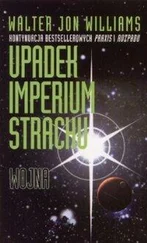Walter Williams - Deep State
Здесь есть возможность читать онлайн «Walter Williams - Deep State» весь текст электронной книги совершенно бесплатно (целиком полную версию без сокращений). В некоторых случаях можно слушать аудио, скачать через торрент в формате fb2 и присутствует краткое содержание. Жанр: Киберпанк, на английском языке. Описание произведения, (предисловие) а так же отзывы посетителей доступны на портале библиотеки ЛибКат.
- Название:Deep State
- Автор:
- Жанр:
- Год:неизвестен
- ISBN:нет данных
- Рейтинг книги:5 / 5. Голосов: 1
-
Избранное:Добавить в избранное
- Отзывы:
-
Ваша оценка:
- 100
- 1
- 2
- 3
- 4
- 5
Deep State: краткое содержание, описание и аннотация
Предлагаем к чтению аннотацию, описание, краткое содержание или предисловие (зависит от того, что написал сам автор книги «Deep State»). Если вы не нашли необходимую информацию о книге — напишите в комментариях, мы постараемся отыскать её.
Deep State — читать онлайн бесплатно полную книгу (весь текст) целиком
Ниже представлен текст книги, разбитый по страницам. Система сохранения места последней прочитанной страницы, позволяет с удобством читать онлайн бесплатно книгу «Deep State», без необходимости каждый раз заново искать на чём Вы остановились. Поставьте закладку, и сможете в любой момент перейти на страницу, на которой закончили чтение.
Интервал:
Закладка:
Lincoln interlaced his fingers, making a single large fist. He placed the doubled fist on the desk before him and leaned toward her.
“The High Zap isn’t the real name,” he said. “But that’s what we’ll call it, okay?”
“Call what? What are we talking about, Lincoln?”
His lips thinned. His clenched fists thumped once, lightly, on the desk.
“It’s hard to know where to begin,” he said.
“The beginning usually works,” Dagmar said.
“Fine.” The fists thumped again on the desk.
“Back in ’91,” Lincoln said, “a U.S.-led coalition launched Operation Desert Storm to drive the Iraqis out of Kuwait. The allied air forces very quickly achieved superiority in the air and began destroying ground targets virtually at will.
“Throughout the Middle East,” he went on, “a rumor spread that the Iraqi air defenses had been knocked out by a computer virus smuggled into an Iraqi defense facility in a printer. The program was supposed to be called ‘Devouring Windows.’ This rumor persists unto the present day.”
Dagmar mentally reviewed the state of cyber arts in 1991, a task made a little uncertain by the fact she’d been a child at the time.
“That couldn’t have happened,” she said. “Right?”
“No.” Lincoln was scornful. “The story originated as an April Fool joke in InfoWorld magazine. The reason Iraqi air defense sites went down is that we were burying them in cluster bombs.”
“That’s what I’d figure,” Dagmar said.
“So after the war was over, and the rumor started going around, people in Washington-and I was one of them-began to wonder, Well, why can’t we? We-the U.S. government, I mean-created the Internet; we should have the keys to take it down.”
He unclenched his hands and spread them flat on the desk. “It took twenty years and a lot of black ops dollars, but eventually we had the High Zap.” He looked around, at the invisible electronic networks that surrounded his cube of an office.
“Now,” he said. “We’re the High Zap’s prisoner.”
Dagmar considered this.
“How does it work?” she asked.
One hand twirled in the air, summoning up a memory.
“Remember back in the nineties, when people were talking about the ‘Java revolution’?”
“Vaguely.”
“Java creates a virtual machine inside the computer that can run programs of its own. The High Zap isn’t written in Java, but the program works the same way-it creates a very simple, very clean little engine inside a router, living between layers of the TCP/IP. When it’s activated, it refuses any packet that doesn’t have the right prefix. Communication is disabled. So communication is completely shut down until a preset time of deactivation has been reached, or until an order arrives that has the correct code prefix ordering it to quit.”
“And in the meantime,” Dagmar said, “the Internet works perfectly well for anyone with the right codes.”
“Correct.”
“How does the Zap get into the router?” Dagmar asked.
Lincoln narrowed his eyes. “That was another technical problem that took a lot of years to solve. Suffice it to say that it was solved, and that it’s now in every router made in the last six or seven years.”
Does it propagate like a virus? Dagmar wondered. But no-routers were different, had different doors into them, and in any case they were made to route information onward, not keep it in memory… But that meant the Zap had to be installed in them, at the factory, and that didn’t make sense, either, because routers were made in so many different countries by so many different companies.
“The Zap can be localized, as it seems to be here,” Lincoln was saying. “The command can be sent to a particular router, and then forwarded to any other router that responds to a ping in a time of a given fraction of a light-second. Of course, if the area is wide enough, it can go clear up to the Clarke Orbit.” He flapped a hand in the general direction of the satellite that had just carried their voices to North America.
“The moon is only-what?” Dagmar tried to remember the figure. “Half a light-second away?”
“Let’s just say the Zap has all the reach it needs,” Lincoln said.
Dagmar’s mind flailed like a drowning man through the sea of fresh information.
“The Zap takes down TCP/IP?” she said.
“Yes.”
“But cell phones don’t use TCP/IP, and they’re down.”
“Telephones use PSTN protocol,” Lincolon said. “But the controls for the telephone relays use TCP/IP-or they do unless they’re old-fashioned mechanical relays. So the Zap guarantees a slow degradation of phone service-the phones will be all right until you need to give them an order through TCP/IP, and then they start going mad, and then the network goes into a death spiral and crashes.” He gestured to his cell phone. “Apparently the local net ran into a whole complex series of problems and went down fast.”
“Jesus,” Dagmar muttered. “Is there more bad news?”
“Lots,” Lincoln said dryly. “TCP/IP is used by all modern military networks. All modern military satellites. All email. All social media. All local area networks. Voice over Internet. The entirety of the World Wide Web.”
An objection occurred to Dagmar.
“But this was designed to bring down military networks, right?” Dagmar said. “Aren’t they kept physically apart from other networks? How do you get to them?”
Lincoln raised an eyebrow. “In the event that we can’t bring down an enemy by preventing them from ordering online merchandise, sending text messages, and participating in flamewars, we can trash a military net provided we can gain access.”
“All it would take,” Dagmar said, “is a connection left open at the right moment. But you can’t count on that.”
“It could be engineered. Or…” He sucked in breath through clenched teeth. “Actually, that’s where our problems started. Because it wasn’t enough to own the Internet equivalent of an End of Times plague for the Internet, some of our politicians wanted to actually use it.”
“So Bozbeyli is just retaliating?” Dagmar asked. “Or-”
“It wasn’t used on Bozbeyli,” Lincoln said. “Back last spring, the Zap was used on our friends the Syrians-and for good reason, because they were continuing their never-ending quest for weapons of mass destruction. The Israelis wanted to stage an air raid on several sites simultaneously, and they wanted the Syrian air defenses down while they did it.”
“So you start with the rumor of a secret method for crashing an air defense network,” Dagmar said, “and then you end up with an actual secret method for crashing an air defense network.” She shook her head. “You people are too literal minded.”
Lincoln was grim. “I’m a little too close to the action to appreciate any irony, thanks.” He leaned back in his Aeron chair. Cold anger haunted his eyes. “I was against the action, quite frankly. I thought the Internet Apocalypse was too big a weapon to use against gnats-I argued that it needed to be held in reserve for a real emergency.”
“But you were overruled.”
Lincoln shrugged. “I can see their point,” he said. “It was in the best possible cause-and I supposed that, if we acted to confirm the 1991 rumor, it would only add to our mystical air of omnipotence.”
“But,” Dagmar pointed out, “to knock out the Syrian air defense, you still had to get into a military network, not just the Internet.”
“You are not cleared for knowing how we could do that,” Lincoln said. “But we could- provided that we made use of some highly advanced equipment available in a listening station in the mountains of southeastern Turkey-which itself exists only because the National Security Agency, which is normally tasked with electronic spying in that area, wouldn’t share their raw data with us, only their conclusions.” His face assumed the caste of indignation. “When we’d ask how they knew what they claimed to know, they’d just say they couldn’t give us that information. It was… vexing. So we got some black ops dollars and built our own station, and once we could fact-check them, the NSA grew a lot more tractable. But I digress…”
Читать дальшеИнтервал:
Закладка:
Похожие книги на «Deep State»
Представляем Вашему вниманию похожие книги на «Deep State» списком для выбора. Мы отобрали схожую по названию и смыслу литературу в надежде предоставить читателям больше вариантов отыскать новые, интересные, ещё непрочитанные произведения.
Обсуждение, отзывы о книге «Deep State» и просто собственные мнения читателей. Оставьте ваши комментарии, напишите, что Вы думаете о произведении, его смысле или главных героях. Укажите что конкретно понравилось, а что нет, и почему Вы так считаете.











